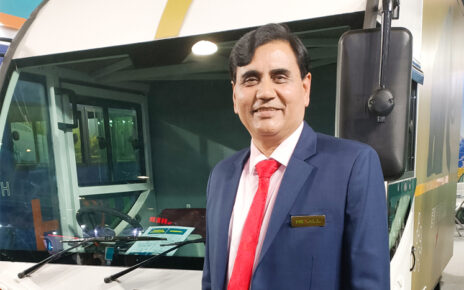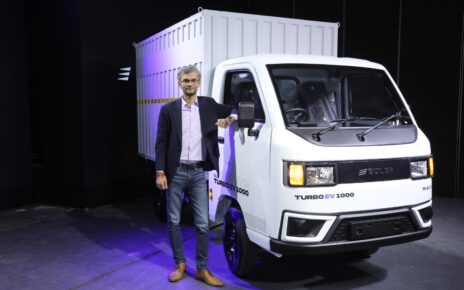
As India’s electric vehicle (EV) market expands at a breakneck pace, Rajesh Rajgor set out to understand how one company is bringing structure to the chaos. In a detailed conversation with Rahul Goenka, Director at ElectroRide, he uncovered how the company is reimagining EV retail in India—not through manufacturing, but through smart systems, dealer support, and a service-first mindset.
ElectroRide, the retail arm of Goenka Green, is a multi-brand dealership network offering electric two- and three-wheelers and e-bicycles. Co-founded by Rahul Goenka in 2021—who also lead Goenka Motors, a legacy automotive business with nearly 40 years of experience—the company plans to launch 2,500 EV outlets and put 10,000 electric vehicles on Indian roads in the coming years. What sets them apart is not just ambition, but their deliberate, system-driven approach to building India’s EV future.
“When we looked at the EV space, it wasn’t the lack of vehicles that worried us—it was the lack of structure,” says Rahul Goenka, Director at ElectroRide. “Dealers were struggling, customers were confused, and most brands weren’t offering support beyond the sale.”
This insight became the foundation for ElectroRide. Rather than enter the manufacturing race, the company took a step back to fix what it saw as the real problem: India’s fragmented and unsupported EV retail landscape. While many rushed to build vehicles, ElectroRide chose to build a system—one that connects OEMs, dealers, and customers with clarity, consistency, and long-term viability.

Unlike many players who chose to jump into manufacturing, ElectroRide took a strategic step back to address a more urgent need: organized retail and after-sales support for EV two- and three-wheelers. With a keen eye on systemic inefficiencies, the company identified and tackled some of the most critical pain points in the industry—high attrition of OEMs, lack of inventory financing for dealers, and inadequate customer support.

“Instead of trying to build everything from scratch, we invested heavily in creating a tech-backed ecosystem that supports OEMs, dealers, and customers alike,” Goenka explains. ElectroRide’s in-house Dealer Management Software (DMS) is central to this system, offering real-time visibility and control to its network. Complementing the digital backend is a strong social media presence that amplifies customer engagement and builds brand awareness.
Not Just Selling EVs—Streamlining the Ecosystem
While ElectroRide is not an EV manufacturer, its extensive product portfolio would suggest otherwise. The company offers 37 models of electric two-wheelers and 26 models of three-wheelers, along with electric bicycles. This broad array allows ElectroRide to serve diverse use-cases, from urban commuters to last-mile logistics operators. “We offer our customers complete transparency and guidance in selecting the right product for their needs, and for our dealers, we serve as a single-window solution for almost everything,” he shares.
This flexibility and responsiveness have proven to be a competitive advantage, especially in a space where OEM exits can leave entire dealership networks stranded. “What makes our model viable is that we’re not locked into a single supply chain. This allows us to adapt quickly to changes, offer alternatives, and protect our dealers from shocks,” he adds. Given the projections by NITI Aayog, which expect India’s EV market to grow at a CAGR of 49% between 2022 and 2030, a model that’s both nimble and scalable is not just desirable—it’s necessary.

Production, per se, is not a focus area for ElectroRide. Rather, the company partners with multiple OEMs across the country, plugging into their manufacturing capacities and creating a seamless front-end sales and service experience. “Our job is to make EV retail easy, credible, and efficient—not to build factories,” Goenka clarifies. “This partnership model allows us to stay asset-light while scaling rapidly across regions.”
Dealer Expansion, Service Backbone & B2B Collaborations
ElectroRide currently operates through 25 dealerships, including three company-owned outlets. Beginning April, the company plans to onboard 10 new dealerships every month, aiming to close the year with a network of 150 dealers. “This will make us one of the most expansive EV dealership chains in the country,” Goenka says confidently. Each dealership comes equipped with a full-service workshop, integrated with the company’s DMS, and backed by transport fleets, stockyards, and even a proprietary warranty administration system.
To ensure operational robustness, ElectroRide has also deployed a team of mobile technical experts—dubbed “flying doctors”—who provide emergency support and resolve dealer or customer issues on the ground. Spare parts stock is also proactively managed to prevent disruptions, especially in light of possible OEM exits. “You can’t promise reliability without planning for uncertainty,” says Goenka. “That’s where our backend logistics and inventory strategy really shine.”
ElectroRide has also caught the attention of major B2B players in India’s logistics, food delivery, and e-commerce sectors. While bound by confidentiality agreements, Goenka acknowledges that the company has already piloted operations with some of the country’s largest platforms. “We’re not just vendors to these giants—we’re collaborators. These pilots gave us deep insights into the challenges of fleet electrification, which we’re now using to build scalable and financially viable delivery service programs,” he reveals.
These partnerships are timely, especially as per projections by NITI Aayog and RMI India that suggest two- and three-wheeled EVs will dominate last-mile deliveries by 2030. “The B2B ecosystem faces unique challenges—thin margins, siloed operations, and fragmented supply chains. We’re taking a divergent approach, co-developing solutions that work at scale,” Goenka says. “This isn’t about plugging into someone else’s model; it’s about building something better together.”
Scaling India’s EV Ecosystem for Long-Term Growth
As the company transitions from its early years into a growth phase, its ambitions are scaling with it. ElectroRide is eyeing a network of over 500 main dealers and an extensive sub-dealer network over the next few years. Plans are also in the works to launch a financial arm and potentially enter into white-labelled manufacturing via contract partners or in-house assembly. These moves align with industry trends toward ecosystem integration—battery swapping, charging infrastructure, and fleet-as-a-service models.
“We’ve always believed that our dealers should be more than just points of sale—they should be partners in a much larger ecosystem,” he emphasizes. “That’s how we ensure sustainable growth—not just for us, but for everyone connected to us.” The company’s strategic direction also aligns with broader national goals. NITI Aayog has forecasted the creation of over 10 million jobs in India’s EV industry by 2030. ElectroRide’s approach—blending grassroots entrepreneurship with structured systems—positions it well to be a significant contributor to this employment wave.
The Indian EV story is still being written, but players like ElectroRide are beginning to bring coherence and strategy to what has often felt like an industry of disconnected sprints. With its hybrid approach—asset-light but service-heavy, multi-brand but unified in vision—ElectroRide is not just building an EV dealership network. It’s helping script the blueprint for how electric mobility should scale in India. And in Goenka’s words, “This is not a sprint. It’s a marathon. We’re here to stay, and we’re here to make a difference.”




